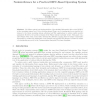Free Online Productivity Tools
i2Speak
i2Symbol
i2OCR
iTex2Img
iWeb2Print
iWeb2Shot
i2Type
iPdf2Split
iPdf2Merge
i2Bopomofo
i2Arabic
i2Style
i2Image
i2PDF
iLatex2Rtf
Sci2ools
SP
2009
IEEE
2009
IEEE
Noninterference for a Practical DIFC-Based Operating System
The Flume system is an implementation of decentralized information flow control (DIFC) at the operating system level. Prior work has shown Flume can be implemented as a practical extension to the Linux operating system, allowing real Web applications to achieve useful security guarantees. However, the question remains if the Flume system is actually secure. This paper compares Flume with other recent DIFC systems like Asbestos, arguing that the latter is inherently susceptible to certain wide-bandwidth covert channels, and proving their absence in Flume by means of a noninterference proof in the Communicating Sequential Processes formalism.
Related Content
| Added | 21 May 2010 |
| Updated | 21 May 2010 |
| Type | Conference |
| Year | 2009 |
| Where | SP |
| Authors | Maxwell N. Krohn, Eran Tromer |
Comments (0)

